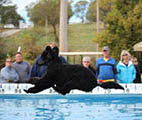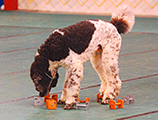POODLE EPILEPSY PROJECT RESEARCH
POODLE EPILEPSY PROJECT RESEARCH
The Poodle Epilepsy Project, headed by Barbara G. Licht, Ph.D at Florida State University, is collaborating with the laboratory of Gary Johnson, DVM, Ph.D. at the University of Missouri. Our goal is to find the gene (or genes) that contribute to idiopathic (primary) epilepsy in poodles. We are interested in all varieties of poodles. Sometimes, receiving information on a new “informative” family of dogs can lead researchers to an important gene discovery. Thus, we always welcome and appreciate new participants.
To participate in the research, owners and breeders of poodles with seizures should contact Dr. Barbara Licht (see end of article for contact information) and provide the following information:
- Pedigree for seizing poodle.
- Owner’s contact information (name, email, mailing address, phone).
- Description of seizures and approximate frequency of seizures.
- Prior illness or injury that could have contributed to the seizures.
If, after providing the above information, you are interested in providing a small blood sample from your poodle(s), Barbara Licht will mail you (via regular mail) a blood sample kit containing instructions for your veterinarian to draw the blood, proper blood tube, shipping materials, and instructions for shipping the blood to Dr. Gary Johnson’s lab, and a letter from the PCA asking the veterinarian to draw the blood free of charge for the research. Most, but not all, veterinarians agree to do this.
Alternatively, you can access instructions from the University of Missouri web site (see below) and click on “sample submission.”
http://www.canine-epilepsy.net/
Samples from affected (those with seizures) and unaffected (seizure-free) poodles are useful for our research. Samples from affected poodles are useful regardless of the dog’s age or pedigree. For unaffected poodles to be most useful, they should be closely related to an affected poodle and be at least 5 years of age.
Based on our published research (see Journal of the American Veterinary Medical Association, November 15, 2007, Vol. 231, No. 10, pgs 1520-1528), idiopathic epilepsy in poodles appears to be inherited as a recessive disorder, meaning that both the sire and dam need to pass down the defective gene in order for an offspring to be affected. This conclusion is consistent with most recent scientific research on other affected breeds as well. It also appears that at least in some poodle families, epilepsy is caused by a single gene pair. However, we cannot be certain about this until we actually find the epilepsy gene (or genes).
If you wish to participate in, or donate to this research, see: http://www.canine-epilepsy.net/. While private donations are greatly appreciated and will be put to good use, potential participants should in no way feel obligated to make a donation. Dr. Licht is always happy to accept new participants and to provide information to owners on canine epilepsy.
For further information about canine seizures, see: http://www.canine-epilepsy.net/
©Barbara G. Licht, Ph.D. 2010
Used with Permission
Updated 3/1/2010
The information contained in these documents is current at the time of this writing and is accurate to the best of VIP’s knowledge.
This information has been provided to you at no charge. You are free to use it provided it is used in its entirety with no changes or alterations and that the copyright remains intact. If you have found this information to be helpful, please consider making a tax-deductible donation to:
Versatility in Poodles
4061 Highlands Rd
Franklin, NC 28734
To make a donation via PayPal, please click the Donate Button:
The contents of the www.vipoodle.org website, such as text, graphics, images, and other material contained on this site (“Content”) are for informational purposes only. The Content is not intended to be a substitute for professional veterinarian advice, diagnosis, or treatment. Always seek the advice of your veterinarian with any questions you may have regarding the medical condition of your pet. Never disregard professional advice or delay in seeking it because of something you have read on this website!
If you think your pet has a medical emergency, call or visit your veterinarian or your local veterinary emergency hospital immediately. Versatility in Poodles and www.vipoodle.org do not recommend or endorse any specific veterinarians, products, procedures, opinions, or other information that may be mentioned on this website. Reliance on any information appearing on this website is entirely at your own risk.















